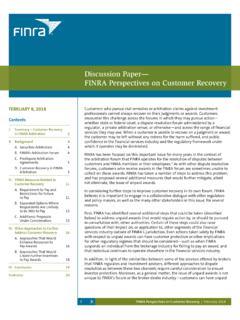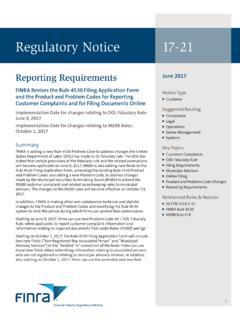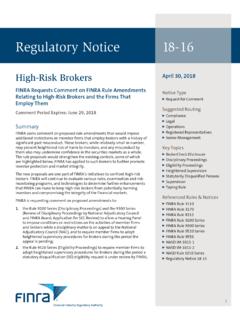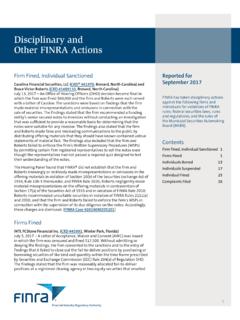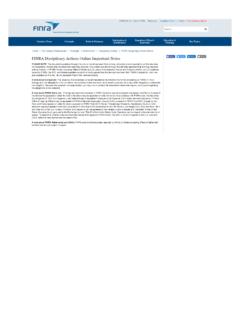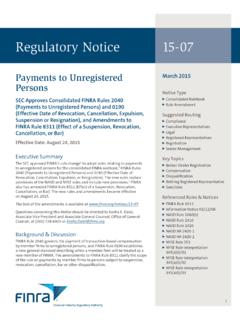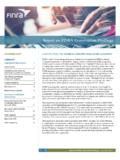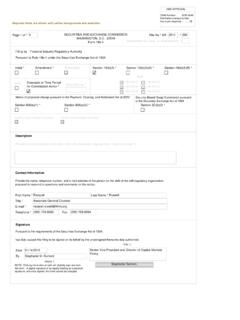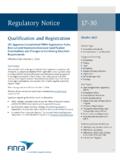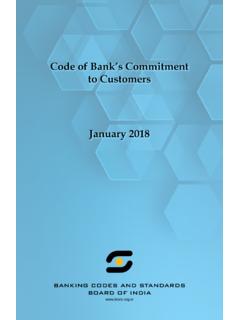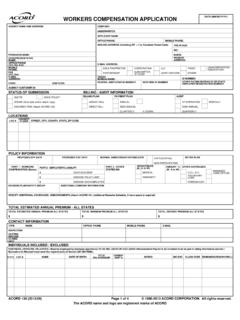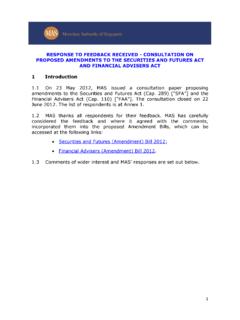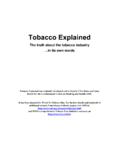Transcription of Regulatory Notice 11-52 - finra.org
1 1 Regulatory Notice 11-52 November 2011 Executive Summary finra is publishing this Notice to remind firms of their supervisory obligations regarding the use of certifications and designations that imply expertise, certification, training or specialty in advising senior investors (senior designations). This Notice also outlines findings from a survey of firms and highlights sound practices used by firms with respect to senior designations. Firms are encouraged to adopt the practices that are outlined in this Notice to strengthen their own supervisory procedures, as appropriate to their business. Questions or comments concerning this Notice may be directed to Lisa Stepuszek, Associate Director, Office of Risk, at (561) and Discussion For several years, finra has focused on firms fair dealings with senior investors, as well as investors at or approaching retirement (hereinafter together referred to as senior investors).
2 In this regard, in September 2007, finra issued Regulatory Notice 07-43, which highlighted certain issues that are common to many senior investors and reminded firms of their obligations in this area. In 20081 and 20102, finra joined with other regulators to issue findings and guidance on firms practices relative to senior investors. Most recently, in the 2011 Annual Regulatory and Examination Priorities Letter, finra reiterated that the protection of vulnerable customers, including senior investors, continues to be a high Regulatory priority. One area of particular focus is the use of certifications and designations that imply expertise, certification, training or specialty in advising senior investors.
3 Senior DesignationsFINRA Reminds Firms of Their Obligations Regarding the Supervision of Registered Persons Using Senior DesignationsNotice Type00 GuidanceSuggested Routing00 Advertising00 Compliance 00 Continuing Education00 Legal 00 Registered Representatives00 Senior ManagementKey Topics00 Communications With the Public00 Designations & Credentials00 Retirement 00 Senior Investors00 SupervisionReferenced Rules & Notices00 Regulatory Notice 07-4300 finra Rule 2010 00 NASD Rule 221000 NASD Rule 3010 00 NYSE Rule 4722 Regulatory NoticeNovember 201111-522011 Senior Designation Survey To better understand the use and oversight of senior designations, in January 2011, finra surveyed retail broker-dealer firms that varied in terms of size, location, product mix and business model.
4 One hundred fifty-seven firms provided responses to the survey, which focused on the prevalence of senior designation usage, the extent to which particular senior designations were used or prohibited and the supervisory systems in place regarding senior designations. Additional survey results are available at responses point to widespread use of senior designations in the broker-dealer community. Specifically, 68 percent of firms that completed the survey indicated that they allow the use of senior designations by registered persons. Of the firms that permit the use of senior designations: 0089 percent currently have registered persons who use senior designations; and 0011 percent do not have any registered persons using senior designations at this time.
5 The following chart summarizes the survey responses of those firms that have registered persons who use senior designations. Survey respondents that allow registered persons to use senior designations were asked whether they prohibit the use of any particular designations. While 73 percent of the responding firms reported that they prohibit the use of particular senior designations, 27 percent said that they do not have any such prohibitions. Of the firms that prohibit the use of particular designations, some banned the use of only one or two designations while other firms were much more restrictive , allowing the use of only a small number of designations. Firms that Permit the Use of Senior Designations23% require approval but do not verify credentials11% do not require approval and do not verify credentials66% require approval and verify credentialsRegulatory Notice 3 November 201111-52 Firms were also asked whether they require registered persons to obtain senior or other professional designations prior to marketing certain products to senior investors.
6 Only two responding firms indicated that they require designations relative to interactions with senior investors. When asked how the firms determined which designations could be used by registered persons, a majority of firms that completed the survey indicated that they review course work, other prerequisites and continuing education requirements prior to allowing or approving a designation. A smaller number of the responding firms indicated that they took a narrower approach by permitting only a select few designations. Other criteria used to determine whether a designation would be permitted included an assessment of state requirements that regulate the use of designations.
7 In certain instances, senior designations approved by firms or widely used by registered persons did not require rigorous qualification standards. As a result, the existence of qualification standards to obtain a designation did not ensure that those registered persons holding the designation possessed financial services skills that were unique or valuable to senior investors. This finding was consistent across survey participants and is of concern to finra . Investors are unlikely to differentiate between designations that represent an enhanced level of proficiency in dealing with financial matters relevant to senior investors versus a designation that is simply a marketing tool.
8 Sound PracticesThis Notice is not intended as a comprehensive summary of all compliance and supervisory matters pertaining to senior designations; rather, it discusses measures that may assist firms in complying with their supervisory obligations. finra encourages firms to consider the practices described below in assessing their own procedures and implementing improvements that will best protect their responding firms indicated that they have adopted and implemented policies governing the use of senior designations. Some firms simply ban the use of senior designations, while other firms establish standards necessary to obtain approval for their use. When standards and approvals are in place, most firms that completed the survey indicated that they monitor whether registered persons have met the criteria to use a particular senior designation.
9 NASD Rule 3010 requires each firm to establish and maintain a system to supervise the activities of each registered person that is reasonably designed to achieve compliance with applicable securities laws and regulations and finra rules. As discussed in Regulatory Notice 07-43, firms, at a minimum, must have supervisory procedures in place reasonably designed to prevent their registered persons from using a senior designation in a manner that is unethical or misleading. Firms that allow the use of any title or designation that 4 Regulatory NoticeNovember 201111-52conveys an expertise in senior investments or retirement planning where such expertise does not exist may violate finra Rule 2010, NASD Rule 2210, NYSE Rule 472, and possibly the anti-fraud provisions of the federal securities laws and finra rules.
10 NASD Rule 2210 and NYSE 472 prohibit firms and registered persons from making false, exaggerated, unwarranted or misleading statements or claims in communications with the public. This prohibition includes referencing nonexistent or self-conferred degrees or designations or referencing legitimate degrees or designations in a misleading manner. Firms therefore must have adequate supervisory procedures in place to ensure that their registered persons do not violate this requirement. As with all supervisory procedures, these procedures should be written, clearly communicated to employees, effectively enforced, and they should cover how approved designations may be used. In addition, finra reminds firms that all advertisements and sales literature as defined in NASD Rule 2210(a), including communications that include the use of these designations, must be approved prior to use and in writing by a registered principal pursuant to NASD Rule 2210(b)(1).
